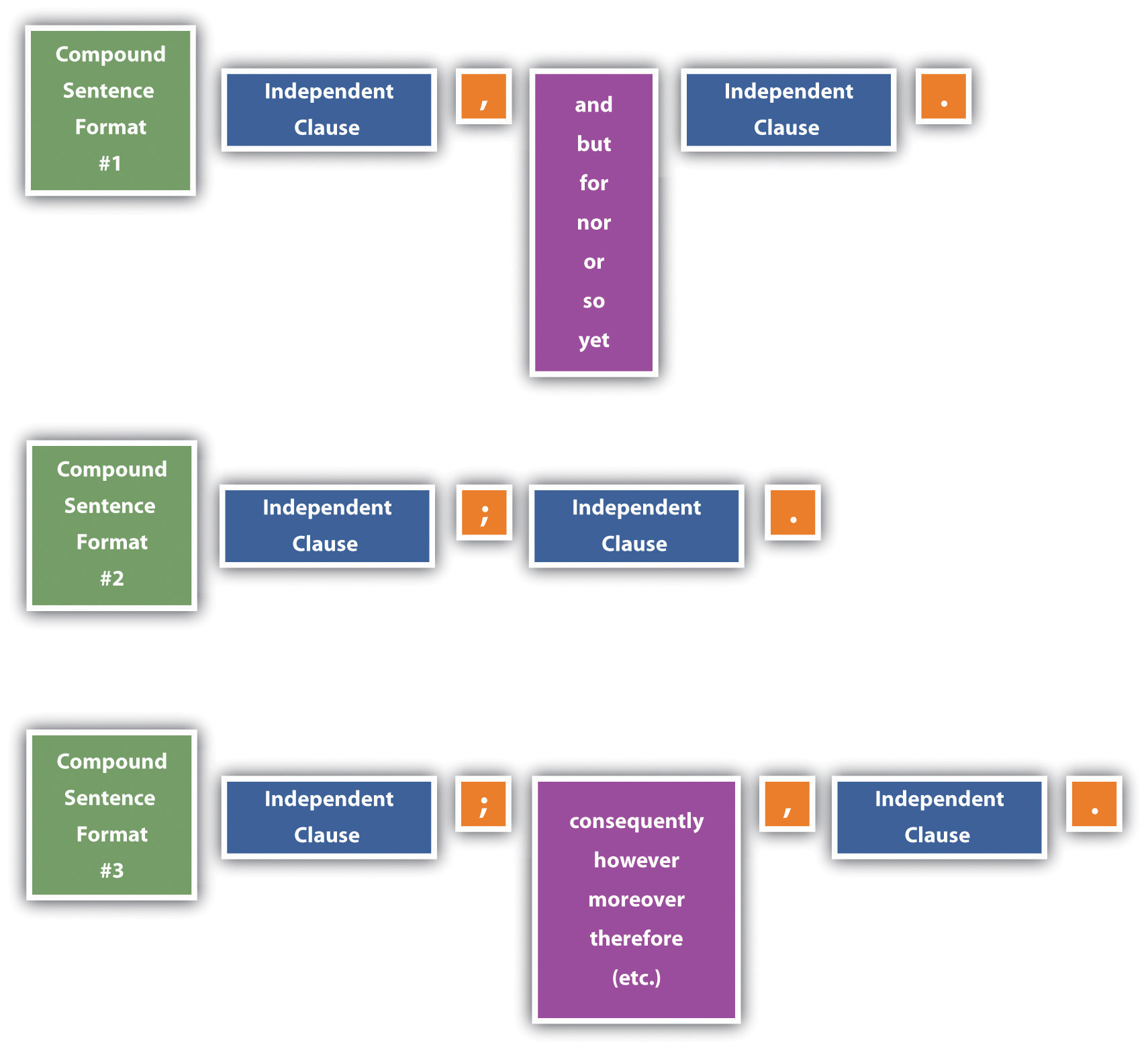Sentence Structure
16
Eliminating Comma Splices and Fused Sentences
Learning Objectives
- Use commas correctly in compound sentences.
- Use semicolons correctly in compound sentences.
- Recognize comma splices and fused sentences.
Two of the most common problems with compound sentences are comma splices and fused sentences. The key to understanding these problems is to recognize the possible compound sentence formats:
- two independent clauses separated with a comma and coordinating conjunction (and, but, so, for, nor, or, yet);
- two independent clauses separated with a semicolon by itself;
- two independent clauses separated with a semicolon and a conjunctive adverb (however, therefore, consequently, moreover, etc.), used to clarify a specific logical relationship between the two independent clauses.
Figure 18.1

Understanding and Avoiding Comma Splices
Two different situations can result in comma splices.
Examples
Problem: A comma joins independent clauses instead of the clauses being joined by a comma followed by a coordinating conjunction.
Example: Her name was Jean Louise Finch, she wanted everyone to call her “Scout.”
Correction: Her name was Jean Louise Finch, but she wanted everyone to call her “Scout.”
Problem: A comma joins two independent clauses when a semicolon should be used.
Example: Atticus didn’t want Scout to fight, however, she could not ignore injustices.
Correction: Atticus didn’t want Scout to fight; however, she could not ignore injustices.
Understanding and Avoiding Fused Sentences
A fused sentence is also called a run-on sentence and occurs when two independent clauses are joined without any punctuation.
Example
Mr. Cunningham is very poor he cannot pay Atticus for legal services.
Correction option 1: Add a coordinating conjunction and a comma: Mr. Cunningham is very poor, so he cannot pay Atticus for legal services.
Correction option 2: Place the independent clauses into two separate sentences: Mr. Cunningham is very poor. He cannot pay Atticus for legal services.
Correction option 3: Place a semicolon between the two clauses: Mr. Cunningham is very poor; he cannot pay Atticus for legal services.
Correction option 4: Place a semicolon between the two clauses, and use a conjunctive adverb for further clarification: Mr. Cunningham is very poor; therefore, he cannot pay Atticus for his legal services.
Correction option #5: Turn one of the independent clauses into a dependent clause: Mr. Cunningham cannot pay Atticus for his legal services because he is very poor.
OR
Because he is very poor, Mr. Cunningham cannot pay Atticus for his legal services.
Key Takeaways
- When you use a coordinating conjunction in a compound sentence, you should place a comma before the conjunction.
- You can use a semicolon between two independent clauses without using a conjunctive adverb.
- If you use conjunctive adverbs, such as however or therefore, place a semicolon before the conjunctive adverb and a comma after it.
EXERCISES
-
Read each compound sentence. Identify each as correctly written, a comma splice, or a fused sentence. For the comma splices and fused sentences, write a corrected version.
- The Gormans bought a new television, and they had it installed over the fireplace.
- We are supposed to get a blizzard tonight we can’t go to the movie.
- My psychology teacher is leaving on a cruise on Monday; the psychology midterm has been canceled.
- The wind was blowing like crazy, it grabbed my bag right out of my hand.
- I didn’t go to sleep until after 3:00 a.m., therefore I am exhausted today.
- Janis traded her hours with Tony last night consequently, she has to work tonight.
-
Write three different versions of a correctly punctuated compound sentence made up of the following pairs of independent clauses, using each of the three formats described in this section (comma plus coordinating conjunction, semicolon only, and semicolon plus conjunctive adverb). Then write a comma splice and a fused sentence using the same pair of independent clauses. Finally, make one of the clauses dependent on the other, use a subordinating conjunction, and punctuate the sentence accordingly.
- He was very hungry / He ate a big lunch
- Thunder rumbled in the distance / The skies opened up
- The candidate ran an excellent campaign / He won the election by ten points
